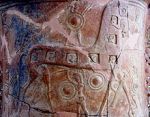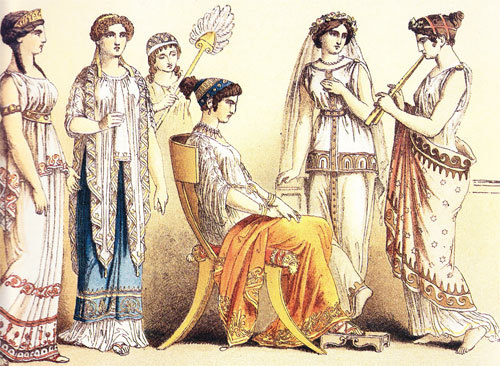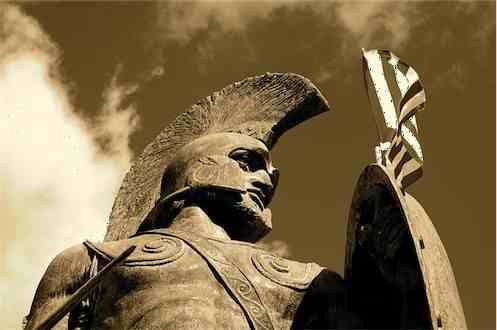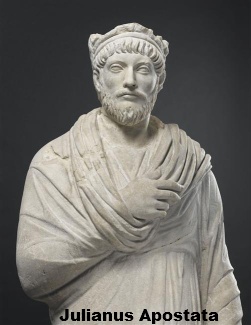The following is my abridgement of chapter 9 of William Pierce’s history of the white race, Who We Are:
Indo-European Invasions Led to Aegean, Greek Civilizations
Hellenic, Pelasgian Spirits Clashed
Greek Myths Hint at Ancient Race War in Mediterranean Area
From the far north they came, the xanthoi, the golden-haired ones: tall, blue-eyed and grey-eyed giants, on horseback and on foot, carrying their battleaxes and their spears, bringing their women and their wagons and their cattle. Warrior-farmers, craftsmen and traders, they worshipped the shining Sky Father and spoke an Indo-European language. They were the Greeks.
The Greeks—or Hellenes, as they later called themselves—crashed down upon the Mediterranean world in a long sequence of waves. The first wave, a relatively weak one—and more properly described merely as Indo-European rather than as specifically Greek—hit about 5,100 years ago, and it apparently took a roundabout course, passing first from the north into western Asia Minor, and thence, by way of the Cyclades and other islands of the southern Aegean, westward into Crete and Greece.
Bronze Age. That first wave introduced metal tools and weapons to the Neolithic culture existing at that time in Crete and on the Greek mainland and laid the basis for the later rise of the Bronze Age Minoan-Mycenaean civilization. It was one of the far-flung arms of the last, great wave of Indo-European migration into central and western Europe from the ancient Indo-European heartland north and east of the Black Sea.
The invaders made a decisive cultural impact on the Aegean world. The archaeological evidence from that period shows a marked break between the nearly static Neolithic tradition which had existed prior to the first Indo-European arrivals and the subsequent Bronze Age cultures.
These later cultures—called Early Cycladic, Early Minoan, and Early Helladic in the Cyclades, Crete, and the Greek mainland respectively—arose rather abruptly about 5,100 years ago and underwent rapid developments in technology, craftsmanship, and social organization.
Blue-eyed Cycladeans. In the Cyclades this first, thin wave of Indo Europeans had a racial as well as a cultural impact. Small marble figurines from the Early Cycladic period still show traces of the pigments with which they were colored, indicating they were made by a red-headed, blue-eyed race.
On Crete and the Greek mainland, however, the Nordic newcomers soon were completely absorbed into the Mediterranean population. The Minoan art of later periods depicts brunet Mediterranean types only.
The bulk of the Indo-Europeans in those early invasions from beyond the Black Sea settled in the relatively empty spaces of the far north, along the shores of the Baltic Sea and the North Sea, in Germany, the Baltic states, and Scandinavia, where they established a new Nordic heartland. A thousand years later they began boiling out of this new heartland in wave after wave, heading south. The Romans—themselves the descendants of one of these waves—would later refer to the German-Scandinavian area as vagina gentium, the womb of nations.
But the Greeks came first, through the Cyclades again into Crete about 4,100 years ago, and overland from the north 100-200 years later. The wave which struck Crete provided the impetus for the building of the great Minoan civilization on the basis which had been laid a thousand years earlier by the first Indo-Europeans to reach that part of the world.
The Minoan civilization was in its essence, however, much more a Mediterranean than a Nordic civilization. The Greeks did not bring civilization to Crete; they brought only the tendency toward civilization and the capacity for building it inherent in the higher human type which they represented.
They brought an innovative spirit and the Nordic will to order, and they imposed that will on the essentially passive and egalitarian Mediterranean society they found, reorganizing it along hierarchical lines. Thus, they established the stratified social basis necessary for the emergence of civilization, and they also provided the ruling stratum.
But inevitably racial mixing occurred, sometimes soon and sometimes later. The Nordics would disappear into the mass, and the civilization they had created would lose its vital spark, stagnating and eventually retrogressing, although it might coast for centuries on its momentum after the disappearance of the Nordic element before retrogression set in. (Racemixing and retrogression were avoided only when the Nordics exterminated the non-Nordic natives of an area instead of merely conquering them. But then there was left no large serf-class for the maintenance of a culturally innovative aristocracy.)
The strongest center of Greek influence on the mainland was Mycenae, and on this center a new civilization arose in the 16th century B.C. Despite the lack of any real literature, it reached greater cultural heights than any previously achieved by man.
In social organization, in architecture, in sculpture and metalwork and ceramics, and in the other arts of civilization the Mycenaean Greeks totally eclipsed the Cretans. The artistic treasures unearthed from the ruins of Mycenae by German archaeologist Heinrich Schliemann in the 19th century astounded the world.
Conquest of Crete and Troy. Early in the 14th century B.C. the Mycenaeans also eclipsed Crete politically, invading that island and subduing it.
A little over a century later—around 1250 B.C.—the Mycenaeans also subdued Troy, in northwestern Asia Minor. The conflict between Mycenae and Troy is the subject of Homer’s great epic, the Iliad.
 The earliest known
The earliest known
depiction
of the Trojan Horse
from the Mykonos vase
ca. 670 BC
Troy itself was, at that time, also a Greek city, and had been for 700 years. An earlier city on the same site, essentially Mediterranean and Minoan in character, had been conquered and rebuilt by Greek invaders in part of the same wave that entered the Greek mainland just after 2000 B.C.
It is still possible to analyze the religion of the Greeks of the historical period into Hellenic and non-Hellenic components. When the Hellenes first came to Greece, they brought with them an Olympian pantheon created in their own image, both physically and psychically. Their gods, with one notable exception (Poseidon, the black-haired sea god), were described by Homer as golden-haired and ivory-skinned.
And Zeus, in his relations with his family of gods and goddesses, perfectly reflected the essentially masculine spirit and the patriarchal structure of all natural and healthy Indo-European societies.
Pelasgian religion was, on the contrary, chthonic (embedded in the earth) in its orientation, feminine in its spirit, matriarchal in its structure. The gods and goddesses of the Pelasgians were mysterious, subterranean creatures, headed by the Earth Mother, who has homologues in the religions of most other Mediterranean peoples.
The Pelasgians’ deities were concerned, above all else, with sexual reproduction, and they were worshipped in orgiastic rites and with much sexual symbolism. Snakes and bulls, for example, the former both phallic and chthonic, the latter a symbol of reproductive potency, played a major role in Minoan religion.
In Greek tradition Zeus overthrew an older group of gods, the children of Gaia, the Earth Mother, before securing his own role as Sky Father and supreme deity. Just as in the case of the Scandinavians it is very tempting to see in this tradition a mythologized reference to the ancient conflict between invading Indo-Europeans and conquered Mediterraneans.
Because the Mediterraneans were only conquered and not exterminated; because they formed the bulk of the economic base on which Greek society rested; because the lifestyle of Hellenes themselves changed, becoming more dependent on agriculture than before; and because race mixture inevitably followed conquest, it is not surprising that the religion of the conquerors underwent a change and assimilated many elements from the religion of the conquered natives.
A people’s religion generally reflects the essential elements of the race-soul of that people, but it is only under completely natural conditions, free from extraneous cultural and racial intrusions, that the reflection is perfect. Whenever a mixing of diverse peoples occurs, the mirror of the soul is clouded; likewise, when a religion of alien origin is imposed on a people, even without racial mixture.
In the latter case the genetic spiritual predispositions remain unchanged and will eventually reassert themselves. Often this reassertion may take many centuries, because the magnet of the soul’s compass is not as strong as we might wish; a long period is required for it to settle down and find its true direction again after it is jarred.



